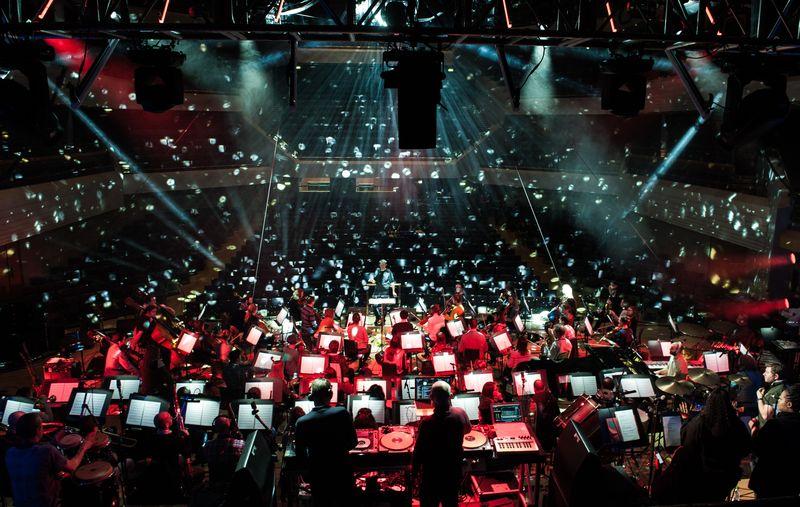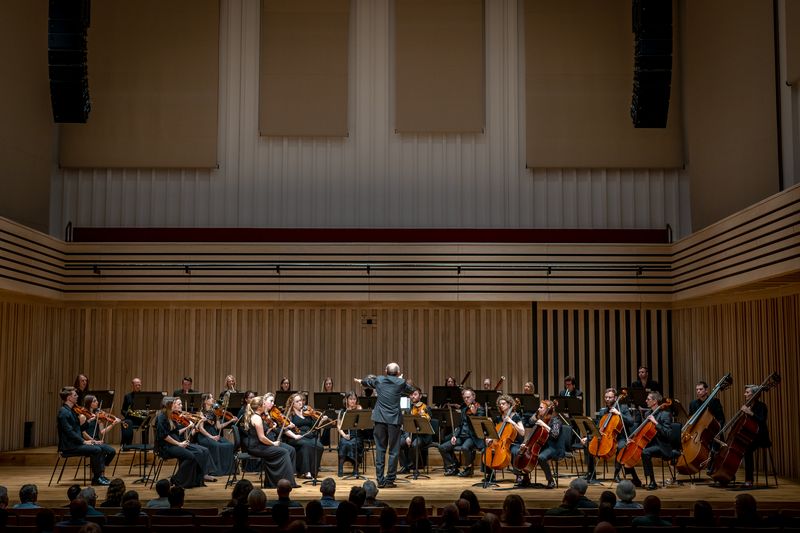First Person: Manchester Camerata's Head of Artistic Planning Clara Marshall Cawley on questioning the status quo | reviews, news & interviews
First Person: Manchester Camerata's Head of Artistic Planning Clara Marshall Cawley on questioning the status quo
First Person: Manchester Camerata's Head of Artistic Planning Clara Marshall Cawley on questioning the status quo
Five days of free events with all sorts of audiences around Manchester starts tomorrow

Over the past decade, Manchester Camerata has gained a reputation for continually innovating and redefining what an orchestra can do. But what does this really mean? For us, this means always questioning the status quo, asking what the impact is, and making our beautiful art form as accessible as possible.
A lot of this ethos began around the time that Hacienda Classical started back in 2016. Hacienda began from a realisation that the traditional concert hall wasn’t always attracting large crowds and a belief that there were other audiences who would enjoy listening to an orchestra but possibly in a different setting with a different set list. At a similar time, we began our Music Cafés and Dementia Research in partnership with The University of Manchester. This has led to us hosting the UK’s first National Centre of Excellence for Music and Dementia. Both of these strands of our work share a central value that is at the heart of what we do at Manchester Camerata, human connection. Between audience and orchestra or musician and person living with dementia. What has happened in the intervening decade has been a journey, focused on that core question of what it means to be an orchestra in the 21st century and how do we make positive change, at its heart.  Here We Are is the next chapter in this journey.
Here We Are is the next chapter in this journey.
It is a five-day collaboration and celebration with venues, artists and communities in Greater Manchester – a great mash-up of the best bits of Manchester Camerata. Five days of free pop-up performances, open rehearsals, and headline shows, will coincide with the launch of ten new Music Cafés for people living with dementia and their carers. With two headline concerts, one at The Monastery in Gorton and one at Aviva Studios we will celebrate the variety of music we perform, from Mozart to a collaboration with Manchester Electronic Duo, Space Afrika. Such is the quality of every player in this orchestra, we are able to split into chamber groups to travel across the city region and perform a wide range of co-curated set lists, in partnership with organisations in each borough. From public transport hubs to Graystone skate park in Salford, and from Bolton Library to Rochdale Exchange Shopping Centre. Here We Are is about meeting people where they’re at and questioning the status quo.
Our current aim is that we will do something similar at the start of each season, asking the people of Greater Manchester about how music functions in their lives, how we can be relevant and accessible to them, and signposting the different ways to get involved with Camerata from concerts to music cafés. This also serves as a great way to lay the musical foundations for the season, in a week working together, right at the start, that encompasses all that we do.
 How does it all happen? A lot of it is to do with trust and clarity of purpose. Trust between our orchestral members, our audiences, our office staff, our Music Director, Gabor Takács-Nagy (pictured above conducting), and our board. This enables us to stretch way beyond the normal parameters of an orchestral performance, and includes choreography, memorisation and improvisation as a core part of our style. The Herds for MIF25 really summed up this trust and also the ethos that we try to create at Camerata. For this project Beethoven’s 7th Symphony was performed outside in Cathedral Garden’s in Manchester to an audience of 6000 people. The performance was interrupted by a stampede of animals, with the musicians splintering around Manchester city centre and performing excerpts of Beethoven 7 from memory in reaction to five-metre high giraffes who were fleeing climate change. It was a really moving performance, but it didn’t just happen overnight; a belief and understanding by everyone involved – from orchestral players to office team to audience – in the purpose and message of the project was critical to its success. This enabled a beautiful sense of teamwork and engagement in "the whole thing". It was every person there who made this possible. A similar sentiment is behind Here We Are and the pop-up performances across Greater Manchester. A real belief in the variety of music we perform and share, and an understanding that this should be for everyone and accessible, rather than always locked up inside a concert hall.
How does it all happen? A lot of it is to do with trust and clarity of purpose. Trust between our orchestral members, our audiences, our office staff, our Music Director, Gabor Takács-Nagy (pictured above conducting), and our board. This enables us to stretch way beyond the normal parameters of an orchestral performance, and includes choreography, memorisation and improvisation as a core part of our style. The Herds for MIF25 really summed up this trust and also the ethos that we try to create at Camerata. For this project Beethoven’s 7th Symphony was performed outside in Cathedral Garden’s in Manchester to an audience of 6000 people. The performance was interrupted by a stampede of animals, with the musicians splintering around Manchester city centre and performing excerpts of Beethoven 7 from memory in reaction to five-metre high giraffes who were fleeing climate change. It was a really moving performance, but it didn’t just happen overnight; a belief and understanding by everyone involved – from orchestral players to office team to audience – in the purpose and message of the project was critical to its success. This enabled a beautiful sense of teamwork and engagement in "the whole thing". It was every person there who made this possible. A similar sentiment is behind Here We Are and the pop-up performances across Greater Manchester. A real belief in the variety of music we perform and share, and an understanding that this should be for everyone and accessible, rather than always locked up inside a concert hall.
From a recent survey to our members, when asked about what Camerata’s USP is they said “Versatility and the quality of playing, communication and connection to our audiences.” The breadth and variety of our programme is our strength and has lead to better ways of communicating, connecting with our audiences, and interpreting art from old to new. The journey has involved risk, and it's fair to say not every risk has worked out, but on balance without that risk taking we don’t think we would have achieved the extraordinary things we have. If we are truly aspiring to be the orchestra who does things differently, and exists to make an impact and serve our local community, why shouldn’t we model all the brilliant things that we do in one week and celebrate the fact that we don’t just do one thing excellently, we do a whole host of things and that makes us stronger.
Explore topics
Share this article
The future of Arts Journalism
You can stop theartsdesk.com closing!
We urgently need financing to survive. Our fundraising drive has thus far raised £49,000 but we need to reach £100,000 or we will be forced to close. Please contribute here: https://gofund.me/c3f6033d
And if you can forward this information to anyone who might assist, we’d be grateful.

Subscribe to theartsdesk.com
Thank you for continuing to read our work on theartsdesk.com. For unlimited access to every article in its entirety, including our archive of more than 15,000 pieces, we're asking for £5 per month or £40 per year. We feel it's a very good deal, and hope you do too.
To take a subscription now simply click here.
And if you're looking for that extra gift for a friend or family member, why not treat them to a theartsdesk.com gift subscription?
more Classical music
 First Person: Manchester Camerata's Head of Artistic Planning Clara Marshall Cawley on questioning the status quo
Five days of free events with all sorts of audiences around Manchester starts tomorrow
First Person: Manchester Camerata's Head of Artistic Planning Clara Marshall Cawley on questioning the status quo
Five days of free events with all sorts of audiences around Manchester starts tomorrow
 Goldscheider, Brother Tree Sound, Kings Place review - music of hope from a young composer
Unusual combination of horn, strings and electronics makes for some intriguing listening
Goldscheider, Brother Tree Sound, Kings Place review - music of hope from a young composer
Unusual combination of horn, strings and electronics makes for some intriguing listening
 theartsdesk Q&A: composer Donghoon Shin on his new concerto for pianist Seong-Jin Cho
Classical music makes its debut at London's K-Music Festival
theartsdesk Q&A: composer Donghoon Shin on his new concerto for pianist Seong-Jin Cho
Classical music makes its debut at London's K-Music Festival
 Helleur-Simcock, Hallé, Wong, Bridgewater Hall, Manchester review - moving lyricism in Elgar’s concerto
Season opener brings lyrical beauty, crisp confidence and a proper Romantic wallow
Helleur-Simcock, Hallé, Wong, Bridgewater Hall, Manchester review - moving lyricism in Elgar’s concerto
Season opener brings lyrical beauty, crisp confidence and a proper Romantic wallow
 Kohout, Spence, Braun, Manchester Camerata, Huth, RNCM, Manchester review - joy, insight, imagination and unanimity
Celebration of the past with stars of the future at the Royal Northern College
Kohout, Spence, Braun, Manchester Camerata, Huth, RNCM, Manchester review - joy, insight, imagination and unanimity
Celebration of the past with stars of the future at the Royal Northern College
 Jansen, LSO, Pappano, Barbican review - profound and bracing emotional workouts
Great soloist, conductor and orchestra take Britten and Shostakovich to the edge
Jansen, LSO, Pappano, Barbican review - profound and bracing emotional workouts
Great soloist, conductor and orchestra take Britten and Shostakovich to the edge
 Jakub Hrůša and Friends in Concert, Royal Opera review - fleshcreep in two uneven halves
Bartók kept short, and a sprawling Dvořák choral ballad done as well as it could be
Jakub Hrůša and Friends in Concert, Royal Opera review - fleshcreep in two uneven halves
Bartók kept short, and a sprawling Dvořák choral ballad done as well as it could be
 Hadelich, BBC Philharmonic, Storgårds, Bridgewater Hall, Manchester review - youth, fate and pain
Prokofiev in the hands of a fine violinist has surely never sounded better
Hadelich, BBC Philharmonic, Storgårds, Bridgewater Hall, Manchester review - youth, fate and pain
Prokofiev in the hands of a fine violinist has surely never sounded better
 Monteverdi Choir, ORR, Heras-Casado, St Martin-in-the-Fields review - flames of joy and sorrow
First-rate soloists, choir and orchestra unite in a blazing Mozart Requiem
Monteverdi Choir, ORR, Heras-Casado, St Martin-in-the-Fields review - flames of joy and sorrow
First-rate soloists, choir and orchestra unite in a blazing Mozart Requiem
 Cho, LSO, Pappano, Barbican review - finely-focused stormy weather
Chameleonic Seong-Jin Cho is a match for the fine-tuning of the LSO’s Chief Conductor
Cho, LSO, Pappano, Barbican review - finely-focused stormy weather
Chameleonic Seong-Jin Cho is a match for the fine-tuning of the LSO’s Chief Conductor
 Classical CDs: Shrouds, silhouettes and superstition
Cello concertos, choral collections and a stunning tribute to a contemporary giant
Classical CDs: Shrouds, silhouettes and superstition
Cello concertos, choral collections and a stunning tribute to a contemporary giant
 Appl, Levickis, Wigmore Hall review - fun to the fore in cabaret and show songs
A relaxed evening of light-hearted fare, with the accordion offering unusual colours
Appl, Levickis, Wigmore Hall review - fun to the fore in cabaret and show songs
A relaxed evening of light-hearted fare, with the accordion offering unusual colours

Add comment